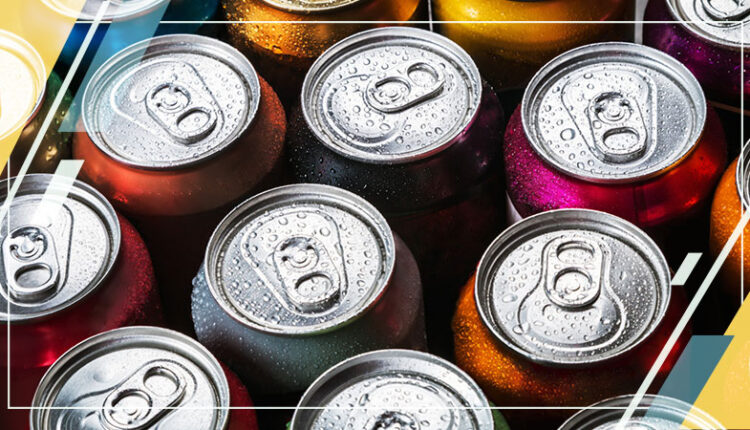In beverage packaging, the humble can stands as an unsung hero, transforming how we enjoy our favorite drinks. From the satisfying pop to the sleek, portable design of these cans, these metal vessels are popular for enhancing the process of drinking beverages. In this blog, we delve into the fascinating world of beverage cans, exploring their evolution, innovations, and the environmental impact that makes them an integral part of the beverage experience.
What are Beverage Cans?
These cans are metal containers designed to hold liquid, such as fruit juices, carbonated soft drinks, alcoholic drinks, teas, and energy drinks. These cans are also known as drink cans. They are typically made of aluminum or tin-plated steel and are widely used for packaging various beverages. Drink cans are available in a variety of styles and sizes, with innovative ends and tabs to engage customers in retail and online interactions, allowing brands to customize their brand experience.
How are Beverage Cans Manufactured?
Previously, drink cans were made using steel, but due to their heavy weight and disposal, drink cans shifted from steel to aluminum cans. These aluminum or tin-plated steels are mainly used in drinking cans.
Aluminum beverage cans are preferable due to their lightweight nature and recyclability. The bodies of these cans are usually made of aluminum alloy, which is usually Al 3004, while the ends are made of a different aluminum alloy, which is Al 5182. The use of aluminum beverage packaging offers several benefits for manufacturers, consumers, and society, such as being portable, stackable, and strong. Aluminum is used in various beverage cans, including beer, soft drinks, coffee, and soda, providing a convenient option for on-the-go consumption.
Unveiling the Benefits of Beverage Cans
Beverage cans, made of metal, offer an array of benefits. Some key benefits of these cans are:
- These cans are the most sustainable beverage packages
- They are fully and infinitely recyclable without loss of quality
- These cans are light-proof, protecting the quality of light-sensitive beverages
- They are also hermetically sealed, keeping oxygen out and carbonation in, allowing beverages to stay fresh for longer
- These cans are easy to transport due to their lightweight
- They can also be stacked to make maximum use of storage
- These cans have a long shelf life
Key Types of Beverage Cans Used in Packaging
The major types of beverage packaging cans include:
● Metal Cans
These include aluminum and steel beverage cans, which are widely recyclable and contribute to sustainability efforts. They are commonly used for packaging various beverages and are known for their recyclability and durability. In this space, Hindustan Tin Works Limited leads the market with specially designed tin cans that maintain the freshness and safety of beverages. Additionally, these tin cans can be stored for extended periods at ambient temperature, eliminating the need for refrigeration during the supply chain.
● Plastic Bottles and Containers
These are commonly used for packaging soft drinks, water, and other non-alcoholic beverages. They are lightweight and convenient, often used for single-serve beverages.
● Glass Bottles and Jars
Glass containers are used for a wide range of beverages, including beer, wine, and various non-alcoholic drinks. They are known for preserving the taste and quality of the beverages they contain.
● Paperboard Cans
These are commonly used for packaging milk, juice, and other liquid beverages. They are lightweight, recyclable, and often feature a protective layer to maintain the freshness of the beverages. Notably, the well-known brand PepsiCo has partnered with Pulpex to develop the world’s first fully recyclable paper bottle for beverages. The innovative packaging solution offers numerous advantages, including sustainability, recycling, and naturalness.
Can Beverage Cans be Recycled?
Drink cans made with metal are recyclable and can be recycled without losing quality. Among the various types of drink cans, aluminum beverage cans are the most sustainable, boasting a higher recycling rate and greater recycled content. With high recyclability, aluminum cans can be reused multiple times without any loss in quality, contributing to energy and resource conservation while lowering greenhouse gas emissions. For instance, the Singapore National Environmental Agency (NEA) has introduced a beverage container return scheme to increase recycling rates and reduce waste. This scheme encourages consumers to return empty drink cans and is part of an Extended Producer Responsibility (EPR) approach to managing packaging waste in Singapore.
Bottom Line
Beverage cans play a crucial role in preserving the freshness and safety of various drinks. Whether it’s maintaining the quality of the product over extended periods at ambient temperatures or contributing to sustainability through recycling, beverage cans continue to be a versatile and essential packaging solution for the industry. As the beverage industry evolves, innovations in drink design and materials further enhance their ability to meet consumer needs while minimizing environmental impact.


